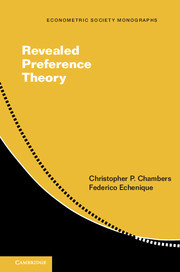Description
Revealed Preference Theory
Econometric Society Monographs Series
Authors: Chambers Christopher P., Echenique Federico
This book examines situations in which empirical observations are consistent or inconsistent with some of the best known economic theories.
Language: English
Subject for Revealed Preference Theory:
Approximative price 30.20 €
In Print (Delivery period: 14 days).
Add to cart
Revealed Preference Theory
Publication date: 01-2016
235 p. · 15.1x22.8 cm · Paperback
Publication date: 01-2016
235 p. · 15.1x22.8 cm · Paperback
Approximative price 87.13 €
In Print (Delivery period: 14 days).
Add to cart
Revealed Preference Theory
Publication date: 01-2016
224 p. · 15.5x23.5 cm · Hardback
Publication date: 01-2016
224 p. · 15.5x23.5 cm · Hardback
Description
/li>Contents
/li>Biography
/li>
Pioneered by American economist Paul Samuelson, revealed preference theory is based on the idea that the preferences of consumers are revealed in their purchasing behavior. Researchers in this field have developed complex and sophisticated mathematical models to capture the preferences that are 'revealed' through consumer choice behavior. This study of consumer demand and behavior is closely tied up with econometrics (especially nonparametric econometrics), where testing the validity of different theoretical models is an important aspect of research. The theory of revealed preference has a very long and distinguished tradition in economics, but there was no systematic presentation of the theory until now. This book deals with basic questions in economic theory, such as the relation between theory and data, and studies the situations in which empirical observations are consistent or inconsistent with some of the best known theories in economics.
Preface; 1. Mathematical preliminaries; 2. Classical abstract choice theory; 3. Rational demand; 4. Topics in rational demand; 5. Practical issues in revealed preference analysis; 6. Production; 7. Stochastic choice; 8. Choice under uncertainty; 9. General equilibrium theory; 10. Game theory; 11. Social choice and political science; 12. Revealed preference and systems of polynomial inequalities; 13. Revealed preference and model theory.
Christopher Chambers is an Associate Professor of Economics at University of California, San Diego. He has published articles in the American Economic Review, Econometrica, Games and Economic Behavior, the Journal of Economic Theory, and Theoretical Economics. He is an associate editor of the Journal of Economic Theory, the Journal of Mathematical Economics, and Social Choice and Welfare. He is also coeditor of Mathematical Social Sciences.
Federico Echenique is a Professor of Economics at the California Institute of Technology. He has published articles in the American Economic Review, Econometrica, the Journal of Political Economy, Games and Economic Behavior, the Journal of Economic Theory, and Theoretical Economics. He is an associate editor of the Journal of Economic Theory, the Economic Journal, Economic Theory, and ACM Transactions on Economics and Computation.
Federico Echenique is a Professor of Economics at the California Institute of Technology. He has published articles in the American Economic Review, Econometrica, the Journal of Political Economy, Games and Economic Behavior, the Journal of Economic Theory, and Theoretical Economics. He is an associate editor of the Journal of Economic Theory, the Economic Journal, Economic Theory, and ACM Transactions on Economics and Computation.
© 2024 LAVOISIER S.A.S.




